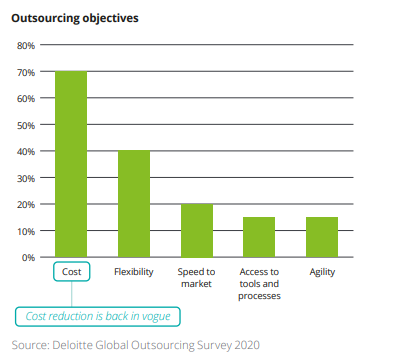The decision to outsource IT services is a critical one for organizations managing the challenge of balancing cost with operational efficiency. While outsourcing provides a strategic approach to reducing expenses and accessing specialized expertise, it also introduces risks that can affect long-term technology strategy.
| “IT outsourcing empowers companies to focus on core strengths while leveraging specialized expertise for technological advancement.” – Jason Sondhi, CEO, EXOS IT |
This article examines the advantages of outsourcing IT services while addressing potential challenges. Therefore, you can use our comprehensive perspective to evaluate this approach to managing your IT tasks.
IT Outsourcing Pros and Cons
Before we get started, here is a quick overview of some of the most common pros and cons.
| Pros of IT Outsourcing | Cons of IT Outsourcing |
| Enhanced Efficiency: Outsourcing can lead to more efficient project completion due to specialized skills and focus. | Loss of Control: Outsourcing can result in reduced control over how IT services and processes are managed. |
| Innovation Access: Outsourcing partners may bring new perspectives and innovative solutions that internal teams might not consider. | Integration Issues: Integrating outsourced services with existing internal processes and systems can be challenging. |
| Risk Mitigation: Outsourcing companies often have better capabilities for managing risk, especially in areas like cybersecurity. | Long-term Costs: While initially cost-effective, long-term contracts with outsourcing firms can become costly. |
| 24/7 Support: Many outsourcing firms provide round-the-clock support, which is beneficial for continuous operations and global businesses. | Reputation Risk: If the outsourcing partner fails to meet standards, it can negatively impact the company’s reputation. |
| Adaptability to Technology Changes: Outsourcing firms often stay abreast of technological advancements, keeping the services they provide up-to-date. | Limited Customization: Outsourced solutions may not be fully tailored to the unique needs of the business. |
Advantages of Outsourcing IT Services
1. Cost Savings
Outsourcing IT services can lead to significant cost reductions by minimizing the need for extensive in-house teams. Organizations save on expenses related to salaries, benefits, training and infrastructure while gaining access to specialized expertise without the overhead of full-time staff.
While some outsourcing models leverage lower labor costs in other countries, many organizations prioritize strategic partnerships with managed IT providers that offer high-quality service, security and compliance within their region.
According to a report by Deloitte, 70% of organizations cite cost reduction as the primary driver for outsourcing IT services.

2. Access to Specialized Talent
Outsourcing IT services provides organizations with access to a highly skilled workforce without requiring extensive in-house training. IT service providers maintain teams of specialized professionals with expertise in cybersecurity, cloud management, network infrastructure and other critical areas.
Outsource Your IT to a Security-Focused Provider with 24/7 Availability |
3. Focus on Core Organizational Functions
Delegating IT operations to a managed service provider enables organizations to focus on their primary objectives. By offloading IT management, leadership can direct resources toward strategic initiatives, enhancing productivity and operational efficiency.
4. Flexibility & Scalability
Outsourced IT services offer the ability to scale technology resources based on evolving operational demands. Whether expanding infrastructure, integrating new solutions or adapting to market changes, organizations benefit from a responsive IT framework without the limitations of in-house capacity constraints.
5. Competitive Advantage
Outsourcing IT services enables organizations to maintain a competitive edge by leveraging advanced technologies and industry best practices. Access to cutting-edge solutions, such as cybersecurity frameworks, cloud infrastructure and automation tools, allows organizations to enhance operational efficiency and innovation without the time and cost that is usually required.
Potential Disadvantages of IT Outsourcing Services
While outsourcing IT services offers many advantages, organizations should proactively address potential risks to maximize value and minimize disruptions.
1. Quality Concerns
Outsourced providers may not always have a deep understanding of an organization’s unique operational needs. The result may be misaligned solutions. Select an IT partner that prioritizes alignment with organizational objectives rather than offering generic solutions. Also, conduct periodic reviews to assess service quality and ensure continuous improvement.
2. Communication & Time Zone Challenges
Working with an IT provider in a different time zone can cause communication delays that affect project timelines and collaboration. Choose a provider that offers real-time support and structured communication processes. You may also implement collaboration tools and scheduled check-ins to maintain workflow efficiency.
3. Security Risks
Trusting a third-party vendor to handle your confidential information does come with a certain amount of risk. However, that is why it is important to partner with an IT provider that adheres to strict cybersecurity standards and regulatory compliance. Make this a requirement in your vetting process.
4. Dependency
Over-reliance on an outsourced provider may become a risk if the partner faces financial instability, leadership changes or service disruptions. Ensure contracts include contingency plans, exit strategies and knowledge transfer processes.
5. Cultural Differences
Variations in work culture, business practices or ethics between an organization and its outsourced provider can create inefficiencies. Choose an IT partner that understands your organization’s industry and operational requirements.
| Learn More About IT Services |
How to Balance the Pros and Cons of IT Outsourcing?
Balancing the benefits of IT outsourcing with its risks requires careful planning and a structured approach.
Conducting thorough due diligence when selecting an outsourcing partner, defining clear communication protocols and setting measurable service level objectives (SLOs) help mitigate potential risks.
A hybrid model, where critical functions remain in-house while outsourcing non-core tasks, can offer a balanced strategy. This approach allows organizations to leverage the advantages of outsourcing while maintaining control over essential operations.
| Explore Key Services From EXOS IT |
Get the Benefits of IT Outsourcing with EXOS IT
Organizations seeking IT outsourcing can reduce risk and improve efficiency by choosing EXOS IT. Our approach minimizes the challenges associated with outsourcing while delivering seamless, secure and strategic IT support.
Contact us to learn more about our managed IT services and how we can support your organization’s growth with a comprehensive outsourcing strategy.




